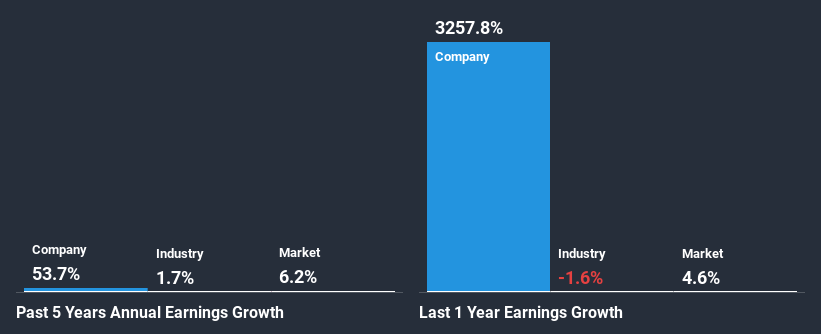Universal Incorporation's (TPE:1325) Stock Has Been Sliding But Fundamentals Look Strong: Is The Market Wrong?
Universal Incorporation (TPE:1325) has had a rough three months with its share price down 32%. But if you pay close attention, you might gather that its strong financials could mean that the stock could potentially see an increase in value in the long-term, given how markets usually reward companies with good financial health. Specifically, we decided to study Universal Incorporation's ROE in this article.
ROE or return on equity is a useful tool to assess how effectively a company can generate returns on the investment it received from its shareholders. In other words, it is a profitability ratio which measures the rate of return on the capital provided by the company's shareholders.
Check out our latest analysis for Universal Incorporation
How Is ROE Calculated?
The formula for ROE is:
Return on Equity = Net Profit (from continuing operations) ÷ Shareholders' Equity
So, based on the above formula, the ROE for Universal Incorporation is:
44% = NT$1.5b ÷ NT$3.3b (Based on the trailing twelve months to September 2020).
The 'return' is the profit over the last twelve months. One way to conceptualize this is that for each NT$1 of shareholders' capital it has, the company made NT$0.44 in profit.
Why Is ROE Important For Earnings Growth?
We have already established that ROE serves as an efficient profit-generating gauge for a company's future earnings. Based on how much of its profits the company chooses to reinvest or "retain", we are then able to evaluate a company's future ability to generate profits. Assuming all else is equal, companies that have both a higher return on equity and higher profit retention are usually the ones that have a higher growth rate when compared to companies that don't have the same features.
A Side By Side comparison of Universal Incorporation's Earnings Growth And 44% ROE
To begin with, Universal Incorporation has a pretty high ROE which is interesting. Additionally, the company's ROE is higher compared to the industry average of 8.2% which is quite remarkable. So, the substantial 54% net income growth seen by Universal Incorporation over the past five years isn't overly surprising.
We then compared Universal Incorporation's net income growth with the industry and we're pleased to see that the company's growth figure is higher when compared with the industry which has a growth rate of 1.7% in the same period.

The basis for attaching value to a company is, to a great extent, tied to its earnings growth. The investor should try to establish if the expected growth or decline in earnings, whichever the case may be, is priced in. Doing so will help them establish if the stock's future looks promising or ominous. One good indicator of expected earnings growth is the P/E ratio which determines the price the market is willing to pay for a stock based on its earnings prospects. So, you may want to check if Universal Incorporation is trading on a high P/E or a low P/E, relative to its industry.
Is Universal Incorporation Making Efficient Use Of Its Profits?
The high three-year median payout ratio of 68% (implying that it keeps only 32% of profits) for Universal Incorporation suggests that the company's growth wasn't really hampered despite it returning most of the earnings to its shareholders.
Moreover, Universal Incorporation is determined to keep sharing its profits with shareholders which we infer from its long history of paying a dividend for at least ten years.
Summary
Overall, we are quite pleased with Universal Incorporation's performance. In particular, its high ROE is quite noteworthy and also the probable explanation behind its considerable earnings growth. Yet, the company is retaining a small portion of its profits. Which means that the company has been able to grow its earnings in spite of it, so that's not too bad. Up till now, we've only made a short study of the company's growth data. So it may be worth checking this free detailed graph of Universal Incorporation's past earnings, as well as revenue and cash flows to get a deeper insight into the company's performance.
If you decide to trade Universal Incorporation, use the lowest-cost* platform that is rated #1 Overall by Barron’s, Interactive Brokers. Trade stocks, options, futures, forex, bonds and funds on 135 markets, all from a single integrated account. Promoted
New: AI Stock Screener & Alerts
Our new AI Stock Screener scans the market every day to uncover opportunities.
• Dividend Powerhouses (3%+ Yield)
• Undervalued Small Caps with Insider Buying
• High growth Tech and AI Companies
Or build your own from over 50 metrics.
This article by Simply Wall St is general in nature. It does not constitute a recommendation to buy or sell any stock, and does not take account of your objectives, or your financial situation. We aim to bring you long-term focused analysis driven by fundamental data. Note that our analysis may not factor in the latest price-sensitive company announcements or qualitative material. Simply Wall St has no position in any stocks mentioned.
*Interactive Brokers Rated Lowest Cost Broker by StockBrokers.com Annual Online Review 2020
Have feedback on this article? Concerned about the content? Get in touch with us directly. Alternatively, email editorial-team (at) simplywallst.com.
About TWSE:1325
Universal Incorporation
Manufactures and sells nonwoven fabrics in Taiwan, the United States, Northeast Asia, and China.
Flawless balance sheet with very low risk.
Similar Companies
Market Insights
Community Narratives



